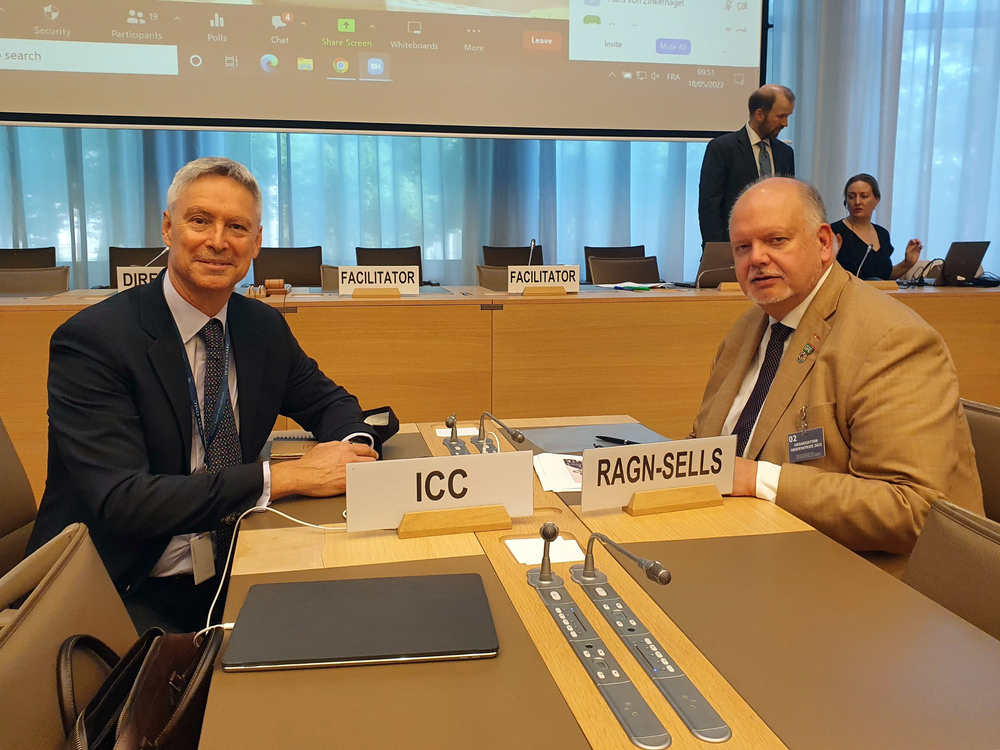”We need international agreements based on the quality, not origin”
On 18 May, the environmental company Ragn-Sells was invited by the International Chamber of Commerce (ICC) to participate in a World Trade Organization (WTO) meeting in Geneva to talk about trade barriers that prevent the transformation to a circular economy.
- If we are serious about creating a sustainable society, we have to start using the raw materials we already have, again and again. To accomplish this we need to acknowledge waste as a high value source for the extraction and recovery of critical raw materials, says Pär Larshans, Director of Sustainability at Ragn-Sells.
Today, half of the world’s emissions are caused by the production of common goods such as food, clothing, cars, etc. This is largely a consequence of raw materials being mined, used, and then thrown away.
WTO decided in 2022 to put focus on the circular economy and the first session on this subject was held at the Trade and Environmental Sustainability Structured Discussions (TESSD) in Geneva on 18 May. Ragn-Sells Director of Sustainability, Pär Larshans, was invited as one of four ICC members from the global community to present concrete examples of trade barriers preventing the transformation to a circular economy.
In the presentation to the WTO, Ragn-Sells highlighted the challenges of trading CO2 – a key enabler and feedstock in to one of Europe’s largest circular economy projects that have the potential to significantly reduce global greenhouse gas emissions.
Larshans also described the challenges related to the use of phosphorus from secondary sources, where legislation today is focused on origin and not on the quality of the raw material.
- Ragn-Sells have a solution that can produce a better quality phosphorus than the phosphorus extracted from primary sources that is offered to the market today. The recovered phosphorus is well suited for organic farming and as a feed phosphate, but many of these applications are currently banned due to legislation prioritising origin over product quality, says Larshans.
Therefore, Ragn-Sells will continue to push for international agreements and legislation that focus on the quality of the raw material, regardless of whether it is extracted from a secondary or primary source.
- I am very honoured to have had the possibility to participate and share our view with the WTO community on the barriers we see hindering the transformation to a circular economy and a sustainable society. In a circular future we will mine from societies' urban flows, not from mother nature, concludes Pär Larshans.
Crispin Conroy, ICC Permanent Observer UN Geneva, and Pär Larshans, Director of Sustainability Ragn-Sells, at the WTO session on 18 May 2022.
For further information, please contact:
Pär Larshans, Director of Sustainability at Ragn-Sells, +46 70 927 29 63, par.larshans@ragnsells.com
Emma Ranerfors, Press Officer at Ragn-Sells, +46 10 723 24 16, press@ragnsells.com
Background:
In 2019 Ragn-Sells participated in a business delegation from ICC Sweden presenting examples to the WTO on trade barriers that prevent the transformation to a circular economy. ICC president John Denton decided in 2021 to have a study performed resulting in this ICC report that was presented to the WTO in February 2022.
Facts: The Oil Shale Ash project
Ragn-Sells’ Oil Shale Ash project aims to produce clean carbon negative PCC (precipitated calcium carbonate) from historical landfill ashes, generated from the incineration of oil shale rock. A result of the past 50 years of Estonian energy production. Read more
Facts: Phosphorus from secondary sources
The Ash2®Phos solution, developed by Ragn-Sells innovation company EasyMining, The Ash2Phos process can transform the sludge ash into a raw material for phosphorus extraction and thereby be a part of a circular solution for phosphorus management. The process consists of three steps: a first acidic step, a second alkaline step (where intermediate products are produced), and finally a conversion step where the intermediates are processed into final products. Read more
About Ragn-Sells Group
Ragn-Sells is a family owned corporate group, with operations in four countries. We started our journey in 1881, and since 1966 we have been involved in waste management, environmental services, and recycling. We collect, treat, detoxify, and recycle waste and residual products from businesses, organisations, and households so that they can become feedstock into new production processes. www.ragnsells.com
